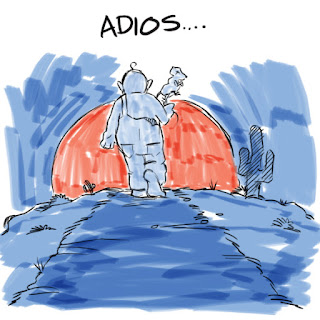I find it kind of sweet that people still get caught up in a
good old-fashioned doomsday prophecy once in a while.
It’s difficult to be certain of anything in this world, so I
don’t mean to poke fun at those who believe the apocalypse is coming in 2012. It
could be.
But what’s charming is that the belief has gained so much
traction that even the well-regarded Guardian newspaper in London, England felt
the need to run a rather serious story this month featuring a German scholar
disputing rumours that the end is nigh.
I like that. We seem
all sophisticated and rational as a society, but just below the surface is a
wide-eyed kid who still believes in things that go bump in the night. Prepare
for a good year on that front regardless of what’s up with the apocalypse,
seeing as the ancient Mayans aren’t the only ones predicting intense times in
2012.
It seems perverse to wish for disaster. But working
ourselves up about a possible apocalypse is obviously something humans enjoy
every now and then, and we do it well. Who can forget Y2K?
The 2012 doomsday prophesy revolves around a stone tablet carved
by an ancient Mayan civilization from the Tortuguero region of Mexico. The
tablet marks 2012 as the end of a 5,125-year cycle of the Mayan long-count
calendar.
Some have taken that as indication that the world will cease
to exist as of Dec. 21, 2012. Of course, you have to put a lot of faith in
ancient Mayans to believe that. But that’s the thing about faith - it doesn’t
need to make sense.
At any rate, the scholar quoted in the Dec. 1 Guardian
article disputed that interpretation of the tablet writings.
Sven Gronemeyer contends the tablet is too damaged to make
out some of the words written on it. He says the legible part in fact says what
lies ahead is a return of the mysterious Mayan god Bolon Yokte. His arrival is
said to mark the end of 13 consecutive periods in the Mayan calendar that each
lasted 400 years.
Oddly enough, my partner and I will have a front-row seat
for whatever action awaits when the fateful day - Dec. 21, 2012 - rolls around.
We will have been in Honduras for almost a year by that point, on a placement
with Cuso International in the very town that Honduran President Porfirio Lobo
has singled out for a tourism happening tied into the Mayan prediction.
We’ll be in Copan Ruinas, the site of major Mayan ruins. Government
hopes visitors pour into the town for the “countdown to the end of time,” giving
the flagging Honduras tourism economy a boost along the way. Whatever awaits - Bolon
Yokte, the end of days, or more likely just some big, wild party - we’re going
to be smack-dab in the middle of it.
A B.C. soothsayer warns of other shakeups closer to home in
2012. Georgia Nicholls, the Vancouver astrologist who writes a newspaper
horoscope column, says “fiery Mars” will preside over all signs for most of the
year. This is apparently a very unusual development.
She advises us to prepare for much more cosmic energy
bouncing around next year. That’s neither good nor bad on its own, adds Nicholls,
but the challenge is in managing all that extra energy.
Nicholls cautioned Sagittarians like me to ease up in 2012 on
their tendency to resist authority. I am taking that to heart. It’s a reminder that
I will soon be working in an unfamiliar culture, political structure and
language, and will need to be the nicest, most easy-going version of myself.
There does seem to be agreement among the ancient Mayans,
the astrologists and the Chinese that 2012 is shaping up to be a corker.
According to Chinese astrology, the 12-month period starting
Feb. 4 is the year of the black water dragon. That heralds a year of
uncertainty and unexpected developments.
“You can have either bad luck or good luck in 2012, and will
have a chance to turn it into better or worse luck,” noted one Chinese
horoscope site. Gulp.
But if it’s really all over next December, luck is the least
of our worries anyway. Have a world-shaking year, and maybe Bolon Yokte and I
will see you in Copan Ruinas.








